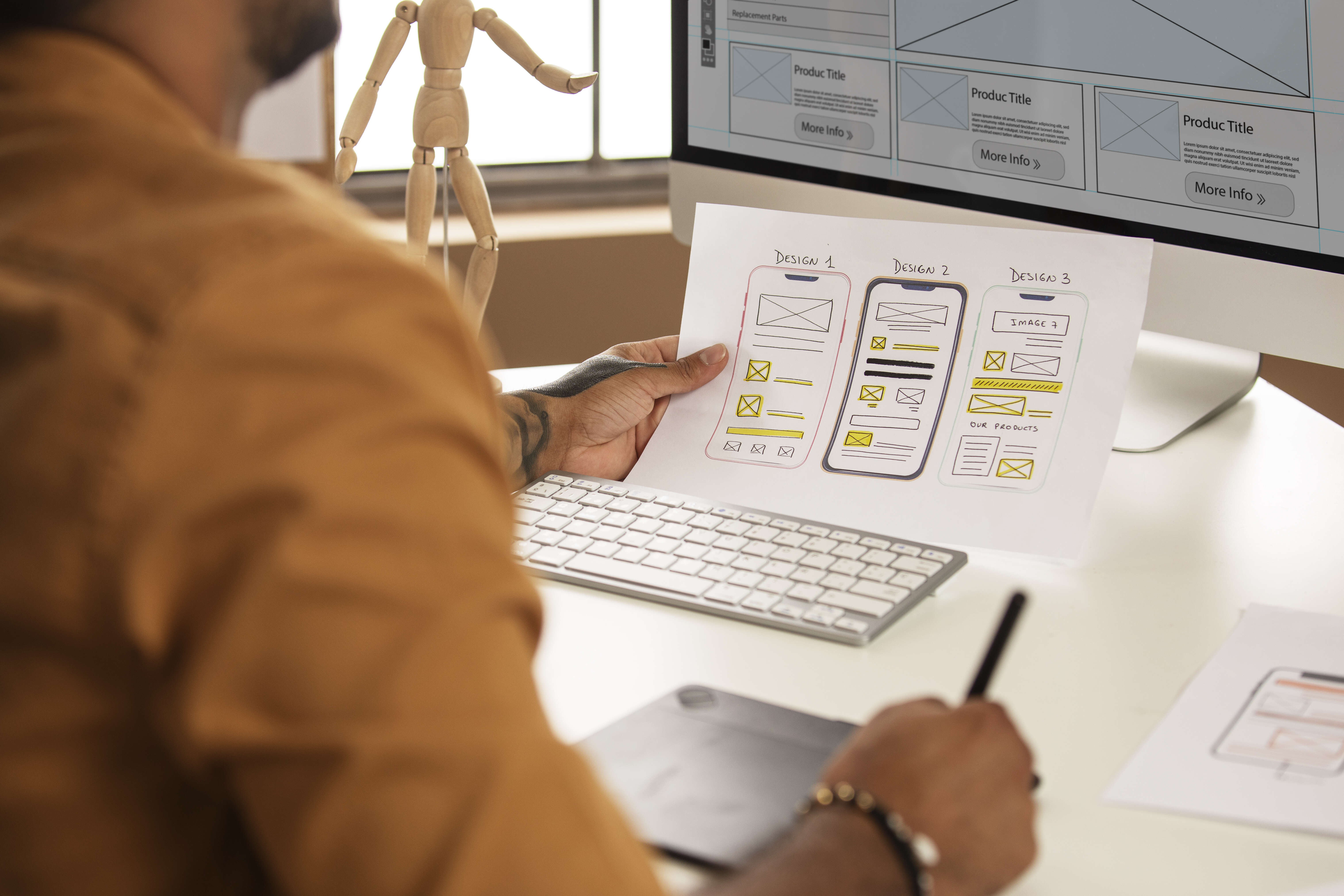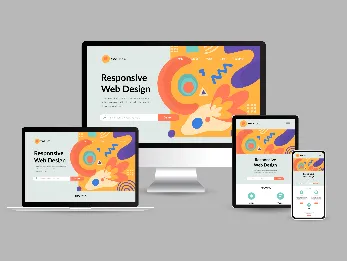The Key Role of Web Design in Modern Business Success
5 mins | 28 Aug 2023

Table of content
1. Introduction
2. What is web page designing?
3. The Art of Designing for the Web
4. Aspects to consider while building a website
6. Conclusion
Introduction
Imagine your website as the canvas on which your brand story unfolds. Just as a painter meticulously selects colors and brushstrokes, your website's design profoundly influences how visitors perceive your brand and navigate your offerings. It's about offering a seamless journey that captivates users and guides them toward their desired destination. In this fast-paced world, where attention spans are fleeting, an expertly designed website can be vital to your online success.
In the era of digitization, having a robust online presence is no longer a luxury but a necessity for businesses. The gateway to this digital landscape is a thoughtfully designed website. However, it's not merely about creating a presence; it's about crafting an online hub that resonates with users, captures your brand essence, and drives meaningful interactions.
What is web page designing?
It's the art of creating visually appealing, user-friendly web pages that resonate with your brand. Every aspect of layout to color selection plays a role in crafting an immersive user experience. Visual hierarchy, easy-to-read typography, and strategic content placement can enhance user engagement and encourage prolonged interaction.

At its core, web design is about creating engaging user experiences. Your design choices affect how users interact with your website, influencing their decision to stay, explore, and eventually convert. Implementing responsive design principles ensures that your website functions seamlessly across various devices and screen sizes, accommodating the diverse ways users access online content.
The Art of Designing for the Web
I. Crafting an Aesthetic Web
The essence of designing for the web lies in creating an aesthetically pleasing and user-friendly environment. By merging visual allure with intuitive navigation, you can craft a virtual space that entices visitors to explore further. Incorporating a balanced color palette, typography that complements your brand's personality, and imagery that resonates with your target audience all contribute to a visually appealing design. The interplay of these elements forms the foundation of a web design experience.
II. Navigating the Basics
Understanding the principles of web design is essential. It's about combining colors, typography, and imagery to mirror your brand's identity. A well-designed web page goes beyond aesthetics; it's about effectively orchestrating elements to convey your message. Utilizing whitespace, maintaining consistent branding, and optimising mobile responsiveness are fundamental aspects of modern web design.
III. Decoding the Anatomy of Website Design
Have you ever wondered how websites are designed? It's a meticulous process involving conceptualization, wireframing, prototyping, and creating a visually striking and functional website. Collaborating with web designers, graphic artists, and user experience experts ensures that every design aspect is meticulously crafted. It's about weaving together creativity and technology to build an outstanding online presence.
IV. Designing with Purpose
The heart of website design lies in understanding user behavior. How do you design a website that aligns with user expectations? It's about creating intuitive layouts, strategic calls-to-action, and seamless user journeys that guide visitors toward conversions. Conducting user research and usability testing helps uncover insights that shape design decisions, leading to an enhanced user experience.
V. The Significance of Website Importance
A website isn't just an online placeholder; it's your digital identity. In a world where first impressions are often digital, your website serves as the first encounter users have with your brand. The importance of a website lies in creating a lasting impression that can influence a user's perception of your business. With well-crafted design elements, your website reflects your brand's values and professionalism.
VI. Navigating Business Necessities
Why is a website essential for your business? It's the hub where potential customers learn about your offerings, explore your services, and make purchasing decisions. It's a platform to showcase your expertise, communicate your values, and connect with your audience. Incorporating case studies, client testimonials, and interactive features can elevate your website into a powerful marketing tool.

Aspects to Consider While Building a Web Design
Just as an architect meticulously plans each detail of a building's layout, creating a compelling web design involves harmonizing various elements. While weaving your digital masterpiece, several vital aspects deserve your careful consideration.
1. User-Centered Approach:
Your website is the virtual doorway to your brand, and its design should be centered around the needs and preferences of your users. Who are they? What do they seek? These questions guide the design choices that resonate with your audience, creating an immediate connection and a sense of belonging.
2. Clear Navigation:
Think of your website's navigation as the signposts guiding travelers through a complex city. Streamlining the navigation ensures visitors can swiftly find what they're looking for. User-friendly menus, logical page hierarchy, and easy-to-spot calls-to-action keep users engaged and prevent them from feeling lost in the digital expanse.
3. Visual Consistency:
Just as a novel's visual aesthetics contribute to its overall appeal, a consistent visual identity across your website instills a sense of coherence and professionalism. Harmonizing color schemes, typography, and imagery establishes visual familiarity, allowing users to recognize your brand at a glance.
4. Content and Context:
Like a storyteller who understands their audience's preferences, your web design should complement your content seamlessly. The arrangement of content should guide users on a narrative journey, ensuring that your message is not just conveyed but embraced.
5. Loading Speed and Performance:
The impatience of the digital age demands that your website loads swiftly and seamlessly. Just as a slow train frustrates passengers, a slow-loading site risks losing visitors before they arrive; optimizing images, compressing code, and choosing efficient hosting are all vital considerations.
6. Mobile-Friendly Design:
As the era of handheld devices continues, your web design should be as comfortable on a smartphone screen as on a desktop monitor. The ability to seamlessly transition between devices ensures that your audience remains engaged, regardless of their chosen platform.
7. Accessibility:
The digital world should be accessible to all, just as a building should have ramps for those with mobility challenges. Implementing features like alt text for images and ensuring keyboard navigation makes your website inclusive and can positively impact your SEO efforts.
8. Interactive Elements:
Much like a lively conversation that sparks engagement, interactive elements on your website create a dynamic user experience. From engaging animations to interactive quizzes, these elements encourage active participation, transforming passive visitors into active participants.
9. Analytics and Iteration:
Akin to an artist refining their creation, analyzing user behavior through web analytics allows you to refine your design continuously. By studying how users interact with your site, you can identify areas of improvement, and make data-driven decisions for a more compelling user experience.

Benefits of Expert Web Designing
1. Enhanced User Experience:
Expert web design focuses on creating a seamless, intuitive user experience. Smooth navigation, well-structured layouts, and easy-to-find information contribute to visitors' positive interactions with your site.
2. Improved Brand Perception:
A professionally designed website conveys credibility and professionalism. Users are more likely to trust a well-designed site, leading to a positive perception of your brand.
3. Mobile Responsiveness:
With most internet users accessing content on mobile devices, responsive web design ensures your site adapts to various screen sizes, providing a consistent experience across platforms.
4. Search Engine Visibility:
Search engines favor websites with user-friendly designs and fast loading times. Expert web design incorporates SEO best practices, improving your site's chances of ranking higher in search results.
5. Higher Conversion Rates:
Strategic placement of calls-to-action, intuitive forms, and easy checkout processes can lead to higher conversion rates, turning visitors into customers.
6. Faster Loading Speeds:
Slow-loading websites frustrate users and can lead to higher bounce rates. Expert web design optimizes images, code, and server settings to ensure fast loading speeds.
7. Scalability:
Your website needs to accommodate increased traffic and content as your business grows. Expertly designed websites are built with scalability in mind, allowing for easy expansion and updates.
8. Competitive Edge:
A well-designed website sets you apart from competitors in a crowded digital landscape. A unique and memorable design can leave a lasting impression on visitors.
Conclusion
In a digital landscape where interactions are virtual, your website acts as the gateway to your brand's universe. A well-crafted website isn't just a checkbox; it's a strategic investment in your business's success. From designing for the web to decoding the intricacies of web page designing, every facet creates an online presence that resonates with users, amplifies your brand, and propels your business forward.
As you expand your understanding of web design's intricacies, you confidently empower your brand to navigate the dynamic digital landscape, capturing online visitors' attention and loyalty in an increasingly competitive environment. Remember, your website reflects your brand and is a powerful tool to shape customer perceptions and drive business growth. By embracing the benefits of expert web designing, you position your business for a future of online success and meaningful customer engagement.
For more information about web signing, check out our article Essential Website Design Factors: A Comprehensive Guide.
Author

Share
Share
Related

Polymers, Innovation, And A Modern Website: The Goldstab Organics Journey
5 mins : 10 Nov 2025

From Friction to Finish Line: The God of Sports Digital Transformation
6 mins : 17 Sept 2025

The Future Of Responsive Web Design: Emerging Trends, Innovations And Predictions In 2024
7 mins : 17 Feb 2026
Other Articles

Responsive Web Design: Understanding The Basics For Seamless User Experiences
7 mins : 29 Apr 2024

Everything You Should Know About The Ideal Screen Size For Responsive Design
6 mins : 26 Apr 2024

Enhance Your Web Design Creativity with Google Web Designer
4 mins : 17 Nov 2023







